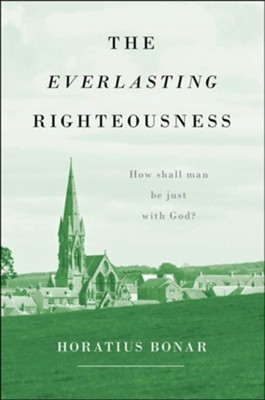Mini-review of The Everlasting Righteousness by Horatius Bonar + Select Quotes

The Everlasting Righteousness by Horatius Bonar
My rating: 5 of 5 stars
This little book was jam-packed with glorious truth. Bonar’s writing is beautiful but clear at the same time. I loved the focus on Christ and Him alone. In fact, one of the chapters is entitled, “Not Faith, But Christ,” in which Bonar explores the truth that our faith, though the link to Christ, is not in the end what saves us. Christ saves us, no matter how weak or trembling our faith is, as long as it is placed in Him. He is our salvation, the strength of our faith is not.
Another topic Bonar wrote upon was assurance of salvation. I’ve attended church my whole life, but I don’t remember hearing one sermon about actually knowing you’re saved. Yes, we are to examine ourselves, to make sure we’re in the faith, but we are also called to rest in the finished Work of Christ and cling to His Word that says we are not condemned if we believe on Him. Bonar pointed out that lack of assurance and the teachings of constantly questioning your salvation follows after Roman Catholic teaching of the Reformation era. The Catholics wanted their followers in fear and doubt as to their soul’s state so the church could demand whatever they wished of their followers. Bonar ends the chapter: “It was intended not merely that he [the believer] should be saved, but that he should know that he is saved, and so delivered from all fear and bondage and heaviness of heart.”
I can’t say I fully agree with Bonar on every point, but overall, I recommend this book to every Christian. We always need to setting before our eyes the all-sufficiency of Christ and His righteousness!
Now, some of the quotes from this book were just stunning, so I have to share just a few with you. 
Our faith is but our touching Jesus; and what is even this, in reality, but His touching us? (p. 87)
All faith here is imperfect; and our security is this, that it matters not how poor or weak our faith may be: if it touches the perfect One, all is well. The touch draws out the virtue in Him, and we are saved. (p. 87)
[image error]Pexels.com" data-medium-file="https://vanessahallauthor.files.wordp..." data-large-file="https://vanessahallauthor.files.wordp..." src="https://vanessahallauthor.files.wordp..." alt="" class="wp-image-504" width="416" height="276" srcset="https://vanessahallauthor.files.wordp... 414w, https://vanessahallauthor.files.wordp... 828w, https://vanessahallauthor.files.wordp... 150w, https://vanessahallauthor.files.wordp... 300w, https://vanessahallauthor.files.wordp... 768w" sizes="(max-width: 416px) 100vw, 416px" />Photo by David Dibert on Pexels.comFaith is rest, not toil. It is the giving up all the former weary efforts to do or feel something good, in order to induce God to love and pardon; and the calm reception of the truth so long rejected, that God is not waiting for any such inducements, but loves and pardons of His own goodwill, and is showing that goodwill to any sinner who will come to Him on such a footing, casting away his own poor performances or goodnesses, and relying implicitly upon the free love of Him who so loved the world that He gave His only-begotten Son. (p. 91-92)
In the passover-blood, the idea was chiefly that of protection from peril. The lamb stood sentinel at the door of each family; the blood was their ‘shield and buckler.’ There might be trembling hearts within, wondering perhaps how a little blood could be so efficacious, and make their dwelling so impregnable; disquieted, too, because they could not see the blood, but were obliged to be content with knowing that God saw it (Exod. 12:13); yet no amount of fearfulness could alter the potency of that sprinkled blood, and no weakness of faith could make that God-given shield less efficacious against ‘the enemy and the avenger.’ The blood – the symbol of substitution – was on the lintel; and that was enough. They did not see it, or feel it; but they knew that it was there, and that sufficed. God saw it, and that was better than their seeing it. They were safe; and they knew that they were so. (p. 14)



